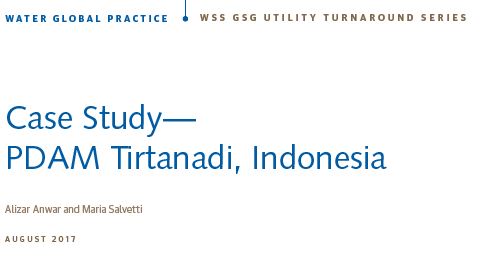Toolkit on the Aggregation Utilities. Toolkit case study in PDAM Tirtanadi, Indonesia
In 1998, Indonesia’s central government encouraged water services to regroup to improve water supply and sanitation (WSS) quality and coverage. Following a strengths, weaknesses, opportunities, and threats (SWOT) analysis, aggregation in the form of a cooperation agreement was decided on at local level and was supported by local governments from the province of North Sumatra. As a result, the water utility of Tirtanadi (PDAM Tirtanadi) signed agreements with nine local PDAMs (water utilities), with a goal of transferring some of its technical, financial, and managerial skills and expertise to those utilities. A decade later, in 2009, that aggregation process proved successful: three water utilities ended their cooperation agreements because they had gained sufficient skills and knowledge to manage their water services by themselves. A Water Sector Undergoing Important Reforms in the 1990s Before 1997, the provision of drinking water in Indonesia was a public duty supervised by the municipalities, whereas the central government’s main role was to establish a standard water sector policy and prepare technical assistance for the sector development. Because of economic turmoil in 1997, the government of Indonesia began to place a stronger emphasis on water, recognizing it as both a crucial economic good and a social good for society. As a result, the Indonesian water sector experienced major changes following important institutional, economic, and political reforms that enabled private sector participation in the 1990s. In 2004, a regulation regarding water resources was enacted to promote integrated and sustainable water management and to decentralize further responsibilities from the national level to the provincial governments. Further regulations opened the possibility for the development of water provision through private sector participation, associations, or self-provision. A regulatory body was also established to promote good-quality service at a realistic price, to ensure a balance between consumers’ and providers’ interests, and to improve the efficiency of drinking water services. A Province-Led Initiative Encouraging PDAM Tirtanadi to Establish Cooperation Agreements North Sumatra is a province of Indonesia that is located on the island of Sumatra. It covers 73,000 km2 and is populated by 13.3 million inhabitants.1 Only 54 percent of its population has access to a drinking water supply; in comparison, under the Millennium Development Goals (MDGs), the target was to achieve 71 percent coverage by 2015 and 100 percent coverage by 2019. The construction of water supply systems in Medan, North Sumatra’s capital city, started in 1905—during the colonial era—and its operation was managed by Waterleiding Maatschappij NV Ajer Beresih. After Indonesia’s independence was recognized in 1950, the management of the company was handed over to the provincial government of North Sumatra. In 1979, a provincial regulation established a provincial water supply enterprise under the name of PDAM Tirtanadi North Sumatra Province. In 1991, the regulation was amended to allow the water utility to also manage the sewerage system. To achieve the MDG target, PDAM Tirtanadi—which already had good technical, financial, and management skills—was expected to help weak local utilities improve their performance. In April 1998, within this context, the Ministry of Home Affairs provided guidelines to PDAM Tirtanadi on establishing a holding company; that was one of several possible options to improve water and sanitation services in North Sumatra. Following a review of those guidelines, the PDAM Association of North Sumatra decided that another option—arranging a cooperation agreement between PDAM Tirtanadi and local water utilities—was preferred. The concept of cooperation was then presented to the governor and the head of the districts, who, in March 1999, formed a merger team to formulate the cooperation framework. In July 1999, PDAM Tirtanadi and PDAM Tirta Deli signed a cooperation agreement, which stated that PDAM Tirtanadi would manage water provision in some of PDAM Tirta Deli’s service areas. In the following 14 months, PDAM Tirtanadi arranged cooperation agreements with nine other water utilities in several districts of North Sumatra—namely, Simalungun, Deli Serdang, Toba Samosir, South Tapanuli, Central Tapanuli, Mandailing Natal, Nias, South Nias, and Samosir. In 2000, PDAM Tirtanadi also took over the operation and maintenance of the sewerage system in the city of Parapat, a tourist resort with a population of 6,105 inhabitants. (See map 1 and table 1.) The cooperation agreement between PDAM Tirtanadi and the other utilities covers a period of 25 years. The agreement is voluntary, although it is recommended by the central government and supported by the provincial government. It encompasses all WSS functions and services. The existing WSS asset, for which ownership remains under local water utilities, has been handed over to PDAM Tirtanadi for the duration of the agreement. At the end of the agreement, PDAM Tirtanadi will return all assets to the individual water utilities.
